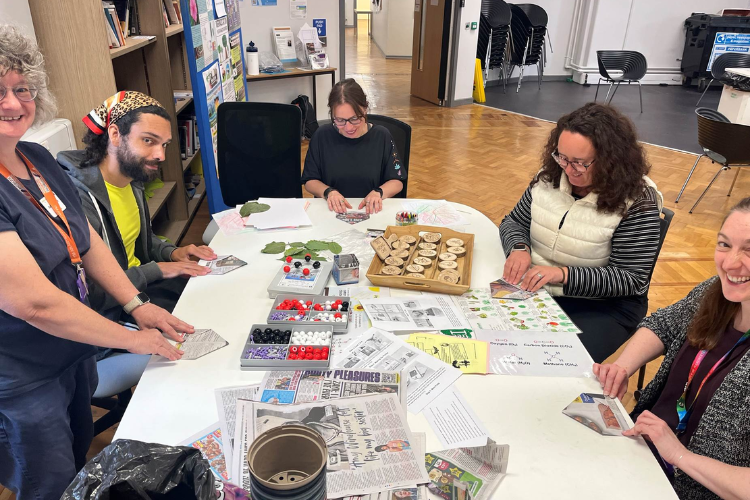
A look into the Division of Medical Education’s Biodiversity Social Afternoon
Blog by Jenny Herbert, Lecturer and Social Responsibility lead in the Division of Medical Education.
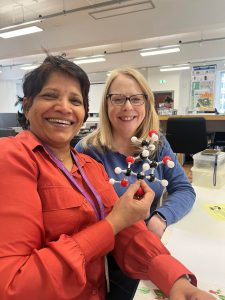 Within the division of medical education (DoME) we decided this year for our divisional gathering to do something that had an environmental twist. Gathering and socialising whilst also learning a little bit about what we can do to help the environment and increase and promote biodiversity on campus and at home.
Within the division of medical education (DoME) we decided this year for our divisional gathering to do something that had an environmental twist. Gathering and socialising whilst also learning a little bit about what we can do to help the environment and increase and promote biodiversity on campus and at home.
Our biodiversity social afternoon was split into three sections: an indoor session with two workshops and two stalls, followed by a bioblitz campus tour with I-Naturalist, and a social in the Stopford front quad. The ES team who helped organise it was pleased with this blueprint pilot and want to encourage other divisions to organise such an event or part of it in the Smith building: contact Maggy Fostier to discuss.
Indoors, each workshop took about 10 min and were led by Jenny Herbert, Jo Pennock, Nox Fu and Maggy Fostier. These were initially designed for the sustainability action month by Yuna Kimura, an ES project student, and we adapted them for a speedier event. Please contact Maggy Fostier if you want access to the workshops material: short or longer with associated PPT information and quizzes.
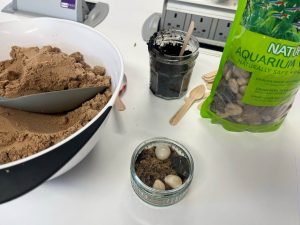
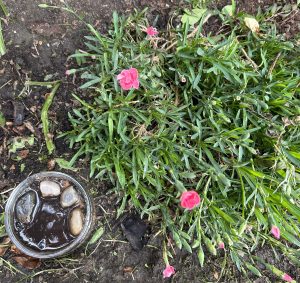 On the day, we made
On the day, we made
- seed bombs, which contained 16 UK native and ethically sourced wildflower seeds, excellent for wildlife in our gardens.
- biodegradable bird feeders from oranges, an excellent alternative to plastic bird feeders as these are fully biodegradable.
- butterfly puddlers, which provides a source of water and nutrients for our butterfly friends, which are sadly dwindling in numbers.
Alongside our workshops we had two stands that taught attendees about trees (led by Sally Freeman and Anisa Visram), and how to identify plants, birds and invertebrates using apps such as I-Naturalist, Seek, RHS ID, and Merlin, or more traditional keys (Led by Brendan Becket, our new quad manager and Sophie Mogg). Plants and seeds were also available for attendees to take home to have a go at growing their own and we had quizzes to test if they could identify common birds and fruit and veg plants.
Next, we had a short bioblitz in the Michael Smith quad using iNaturalist. In our wildflower patches, three rare species of wild orchids are currently in bloom: bee, marsh and spotted (pictures). We also have many shrubs and trees, raised beds tended by volunteers, and a pond with associated wildlife. This tour could be further extended to discover further ‘nature positive’ spots on campus, as described in Jacob’s blog.
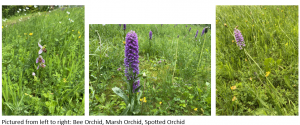
The ES team wants to encourage everyone to record species on campus. This will allow you to ID species you do not know, but, even if you do know them, please snap away, as this is the tool we have chosen to help us monitor biodiversity on campus across seasons and years. You can do this by adding to the University’s iNaturalist project
As well as being an educational event, attendees had a lot of fun. Being outdoors and having an awareness of nature also has a positive impact on individuals wellness and mental health. Promoting beautiful green spaces that can sustain wildlife is important and has a positive impact on everyone. It was a joy to run this event and be a part of this movement on campus. We hope others will follow suit and think about running events that are fun but also educational.
Many thanks to all the staff and students involved: Jenny Herbert, Maggy Fostier, Harriet Bickley, Sally Freeman, Brenden Beckett, Anisa Visram, Jo Pennock, Nox Fu and Sophie Mogg.
To find out more about Environmental Sustainability: visit the Faculty’s intranet page, website, read our ES Good Newsletter or contact srbmh@manchester.ac.uk . For more information on Environmental Sustainability at the University watch this short film or visit their website.

0 Comments